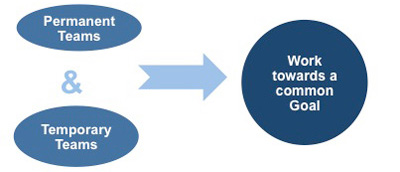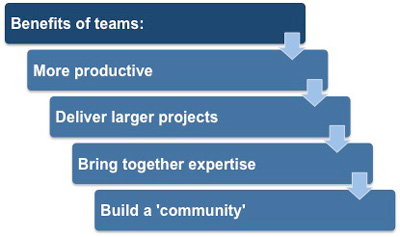How to Motivate Your Team
A great deal of research has been published on team building and team motivation. Even though most of this research is purely academic and has been performed in a research environment rather than in the workplace, some of it does contain value for a working manager.
In particular, there have been two studies that you should be familiar with: Bruce Tuckman's 'Stages for a Group' and Richard Hackman's 'Five Factor Model'. This eBook describes both of these in detail and explains how they can help you with practical day-to-day team building and team leadership.
How one defines a team varies according to the context one is referring to, but it is useful to look at three widely accepted definitions:
'[A team is a] group in which members work together intensively to achieve a common group goal.' (Lewis-McClear & Taylor, 1998)
'A team is a small number of people with complementary skills who are committed to a common purpose, performance goals, and approach for which they are mutually accountable.' (Katzenbach & Smith, 1993)
'[A team is made up of people] working together in a committed way to achieve a common goal or mission. The work is interdependent and team members share responsibility and hold themselves accountable for attaining the results.' (MIT Information Services and Technology, 2007)
The common thread in each of these definitions is that teams consist of a group of people who share a common understanding of their goal and work together to accomplish it.
 |
None of these definitions states whether the team is a fixed or transient entity, yet in the world of work there are many examples of both permanent and temporary teams:
• A temporary group could be brought together to:
o Investigate or solve a specific issue
o Design a new product or service
o Act as a committee to resolve an issue
• A permanent group could be formed:
o To act as a steering committee
o With responsibility for a particular function
o From the same functional area who meet regularly to seek work improvement opportunities
Whilst the purpose of the team may be described as permanent in the examples above it is inevitable that the membership of this type of team will change over time.
This will be for a variety of reasons: for example, individual members, including the leader, may leave or be replaced; those with a scarce skill may be seconded to another team that is in greater need of their skills; or a team's composition will change, even if the purpose remains, when an organization is taken over by or merged with another.
The support structure you have at your disposal will directly affect the success of your team, and your ability to reward, develop, and inform your team members will play a significant part in your team's and your own success.
Whether you are managing a temporary or permanent team there are considerable benefits successful teams bring to organizations.
 |
Many projects in the workplace are too large or complex for one individual to complete and the use of teams ensures the project's timely success. This is especially true of IT development projects and organization-wide projects.
Perhaps one of the most important benefits a team can provide is that of increased and broader-based expertise when compared to an individual. One person on their own will not have all the necessary skills to deliver a product or service.
Teams comprise individuals with complementary knowledge that can far exceed that of a single person. Team members are also able to coordinate their efforts in order to produce the desired outcome on schedule and to budget.
Through specialist teams and steering committees departments can combine their knowledge to take an active role in company-wide and strategic-level decisions. This helps these divisions and departments to feel they have some 'ownership' of the decisions made when the board acts upon these recommendations.
This 'ownership' reinforces the organizational community feeling. This community sentiment permeates throughout the organization and is often the motivation for calling a group of people a team. An example of this is a Customer Support Team where individuals share the same set of skills and all do exactly the same job, thus having a collective expertise within the team.
By creating this type of team environment management boosts the morale of both the individual and the workplace. This does not mean all groups of people performing the same role are referred to as a team (e.g. the accounts department), but they have their group identity, and morale is based on their department's contribution to the organization.
Team working provides a wide variety of benefits to organizations from bringing together diverse expertise to building a workplace community. This makes it very difficult to generalize about teams as even within the same organization there will be teams that have very little in common.
The best leadership style for any particular team will be influenced by its purpose and composition. This means that you will have to think carefully about each piece of team building or team management advice that you encounter. You will need to ask yourself, under what conditions would this be helpful, be of limited use, or be completely inappropriate?
Remember, your ability to manage and motivate teams under your authority will have a significant correlation with your career aspirations because team leadership is such an essential skill in the modern workplace. This Team Development Checklist shows you the behaviors your team requires you to exhibit during its four-stage development.
You may also be interested in:
How to Motivate Your Team | Bruce Tuckman's 'Stages for a Group' Theory | Richard Hackman's 'Five Factor Model'.



